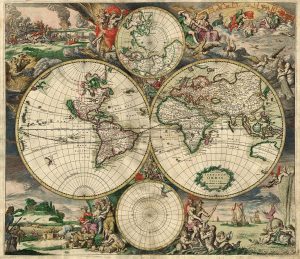Over this academic year, the Scottish Centre for Global History (SCGH) and the Centre for Scottish Culture (CSC) will be holding a number of online research seminars. For more information and if you would like to attend any of the below seminars please contact:
- Dr Matt Graham, Director, Scottish Centre for Global History (m.v.graham@dundee.ac.uk).
- Professor Graeme Morton, Director, Centre for Scottish Culture (g.z.morton@dundee.ac.uk).
All seminars take place via Microsoft Teams
NB: In line with Scottish Government recommendations to limit social mixing, please be advised that all research seminars will be held online until further notice. This situation is due to be reviewed in February 2022.
Topics & Authors
Below is a list of all Research Seminars that have already been or will still be conducted at the University of Dundee during the academic year 2021/22 highlighting the range of topics covered in the field of history.
Completed Research Seminars
Semester 1 – 2021
1) On Wednesday, 6th October 2021, the first SCGH and CSC research seminar took place in which Professor Graeme Morton presented his latest research from his new book entitled Weather, Migration and the Scottish Diaspora: Leaving the Cold Country. The study seeks to answer why large number of Scots left a temperate climate to live permamently in parts of the world where greater temperature extreme was the norm.
Date: Wednesday, 6th October, 2021
Time: 4:30-6 p.m.
Venue: University of Dundee campus, Dalhousie Building, 2F11
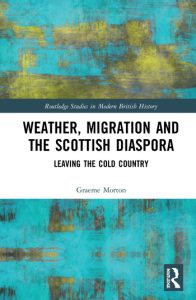
The long nineteenth century was a period consistently cooler than now, and Scotland remains the coldest of the British nations. Nineteenth-century meteorologists turned to environmental determinism to explain the persistence of agricultural shortage and to identify the atmospheric conditions that exacerbated the incidence of death and disease in the towns. In these cases, the logic of emigration and the benefits of an alternative climate were compelling. Emigration agents portrayed their favoured climate in order to pull migrants in their direction. The climate reasons, pressures and incentives that resulted in the movement of people have been neither straightforward nor uniform. There are known structural features that contextualize the migration experience, chief among them being economic and demographic factors. By building on the work of historical climatologists, and the availability of long-run climate data, for the first time the emigration history of Scotland is examined through the lens of the nation’s climate. In significant per capita numbers, the Scots left the cold country behind; yet the ‘homeland’ remained an unbreakable connection for the diaspora.
2) Professor Sanjay Sharma, Leverhulme Trust Visiting Professor, held his first seminar on 20th October entitled From Charity to Philanthropy: The Transformation of State Welfare in Modern India. The paper examines the roots of state welfarism in modern India through the prism of famine relief in colonial north India from the nineteenth century.
Date: Wednesday, 20th October, 2021
Time: 4:30-6 p.m.
Venue: University of Dundee campus, Dalhousie Building, 1LG03
Before the colonial era, almsgiving was considered a religious, social and political obligation for local elites and rulers that enhanced and sustained their legitimacy. During the nineteenth century, the colonial state became an agent of a complex transformation of indigenous charitable practices and notions of benevolence and charity. The practices and principles of ‘native charity’ were depicted as desultory, arbitrary and personal, while responses of the colonial authorities were presented as rational, organised and institutional. The contrast was heightened in times of famine when the colonial state was drawn into the web of obligations and duties towards its starving subjects. This led to detailed reports on famines and the famine codes for relief in the later decades of the nineteenth century when a number of severe droughts and famines led to widespread deaths and disease. State relief was driven by humanitarian and pragmatic concerns while being marked by suspicion of misuse of government charity by the undeserving and fear of encouraging indolence among the relief-seeking paupers. The imprint of the debates around the New Poor Law (1834) and of Victorian England on these ideas of relief in the colonial context are palpable. By offering relief on ‘works of public utility’ like roads, railways and canals, and the institutionalisation of famine relief, the colonial state claimed to be the ultimate source of welfare and true munificence. In the process it came to be endowed with new duties and responsibilities towards the subject population that it strove to restrict, revealing the limits of colonial welfare. Claims of benevolence allowed the colonial state and the market a more interventionist role leading to Indian society’s expectations from and ‘enchantment’ with the capacity of the state for welfare in post-independence times also.
3) Professor Stuart Anderson, specialising on the history of pharmacy at the Centre for History in Public Health at the London School of Hygiene & Tropical Medicine, held a discussion outlining the contents of his latest research in a paper presented on 27th October entitled Legacies of Colonialism: Pharmacy, Medicines, and Slavery in the British West Indies, 1780 – 1920.
Date: Wednesday, 27th October, 2021
Time: 4:30-6 p.m.
Venue: University of Dundee campus, Dalhousie Building, 1LG03
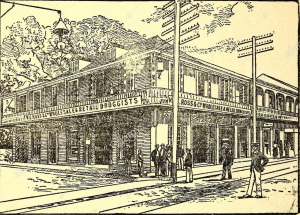
This seminar explores the impact of slavery and colonialism on the development of pharmacy and the availability of medicines in the British West Indies. Slavery initially offered lucrative opportunities for metropolitan apothecaries engaged in the supply of medicines, and wholesale and retail druggists were established on the islands. But after slavery, social, political and economic circumstances led few English chemists and druggists to open businesses. Those who did largely provided services for the expatriate, European community. The local population relied mainly on unqualified traders. By the late nineteenth-century the colonial authorities provided facilities for the training of local dispensers, who were able to work in government clinics and hospitals, but not open pharmacies. British chemists and druggists held monopolies in the supply of substances not available elsewhere, but often struggled to make a living, even with patronage from some locals. Few prerequisites for professionalization were in place during British rule. Pharmacy Acts giving pharmaceutical societies legal recognition, and allowing pharmacists to regulate themselves, came only after independence. The development of pharmacy institutions, education and regulation were all largely neglected during the years of colonial rule. British pharmacy legislation had little impact on the local people; it privileged European health over that of the Black population. The legacies of British colonialism and slavery in the West Indies were therefore delays in the professionalization of pharmacy, and greatly reduced access to medicines by much of the population.
4) On 10th November, Dr Pragati Mohapatra, lecturer in the Department of History at Indraprastha College for Women (University of Delhi), presented her latest research in a paper entitled Negotiating ‘Nationalist Desires’: The Life and Times of Kuntala Kumari Sabat; Doctor, Poet and Nationalist (1901-39).
Date: Wednesday, 10th November, 2021
Time: 4:30-6 p.m.
Venue: University of Dundee campus, Dalhousie Building, 1LG03
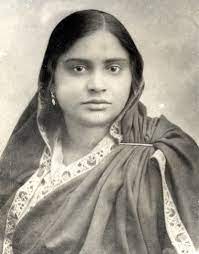
While studies of nationalism have often emphasised how nations have incorporated gender and gender roles into the body politic through a variety of representational strategies, comparatively less attention has been given to women’s experience of this process. When women appear in accounts of national movements (in South Asia and elsewhere), more often than not, they do so in a ‘contributive’ role, working within boundaries laid down by men. Feminist historians on the other hand, have sought to redress the balance and have focused on women either as ‘victims’ of patriarchal ideologies and oppression or as rebellious heroines who defied the limitations imposed on them against all odds. These paradigms, however, do not exhaust the range of women’s experience or possibilities of their capacities as agents. It is, therefore, important to develop a frame-work for understanding these processes where various forms of agency ranging from consent, complicity and contestation can and do co-exist.
This paper studies the life and work of Kuntala Kumari Sabat – poet, novelist, doctor and a prominent nationalist from Odisha, in Eastern India. Her life (1901-39) largely coincided with the political movement for the unification of Odiya-speaking areas within the British Indian empire – a cause close to her heart. She also lived through a particularly turbulent phase of the Indian nationalist movement, marked by increasing communal tensions and mass politics. My primary concern is her location within the matrix of ideas which surrounded her. Her life and writings provide us with a unique opportunity to examine a number of important issues: the articulation of a language-based regional cultural identity and its relationship with a larger Indian national identity, its enmeshing with a Hindu/Aryan past; the particular ways in which revivalist nationalism empowered women while simultaneously limiting their emancipatory possibilities and how women negotiated ‘desire’ while carrying the burden of nationalist expectations.
5) On 17th November Dr Sascha Auerbach, lecturer in Modern British and Colonial History at the University of Nottingham, discussed his latest research in a paper entitled Not Fit for the Enjoyment of Freedom: Amelioration and the Origins of the Overseer State in the British Empire, 1812-1834.
Date: Wednesday, 17th November, 2021
Time: 4:30-6 p.m.
Venue: University of Dundee campus, Dalhousie Building, 1LG03
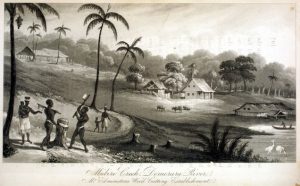
Exploring the crucial transition period from slavery to indentured labour in the nineteenth-century British Empire, this paper makes three arguments. The first is that while indenture’s position in the plantation economy may have echoed the practices of slavery, which had been primarily a private enterprise, the origins of its legal framework lay in the state apparatus introduced to manage the transition from slavery to free labour. Likewise, its ideological underpinnings drew on the justifications for this new apparatus. The central aspect of these new state processes and their ideological adjuncts was the transformation of the plantation workforce from private property that was controlled by owners into subjects of rule who were answerable to the state. The second argument is that these new mechanisms of labour regulation came to play a crucial role, structurally and conceptually, in anchoring colonial rule not just in the post-emancipation Caribbean, but as far afield as Mauritius and South Africa. This radical process of reform was justified ideologically as a moral imperative, politically as a means of maintaining order and sustaining revenue, and culturally as a paternalistic enterprise to uplift the abused and exploited slaves who were transitioning from property to Crown subjects.
A third, corollary argument made here is that, during the amelioration period, plantation colonies, and directly-ruled Crown colonies in particular, became sites of experimentation in governance, setting important precedents for the subsequent introduction of interventionist social reform in the metropole. The rapid upswing in the authority of a centrally-directed imperial state (at the cost of colonial self-governance) was accomplished through its growing predominance in managing not just laborers, but the entire colonial labor system, including planters, owners, managers, and overseers. This made labour system regulation a keystone of imperial sovereignty in the tropics. Across the nineteenth century, this coordinated network of laws, administrators, institutions and practices would come to constitute what I call “the overseer state.” It would enhance the effectiveness of colonial governance over local populations, increase the accountability of local state agents to directives from the metropole, widen the adaptability of state institutions to the responses of those under their suzerainty and, most importantly, allow the state to regulate and coordinate the Empire’s most valuable resource, labour. New modes of recording, inspection, regulation and enforcement introduced to colonial labor management in the 1820s would presage the adoption of similar policies and mechanisms in Britain, by years or even decades.
6) On 8th December, Dr Gerard Lee McKeever, from the University of Stirling, capped off the calender year 2021 with a final research seminar in which he presented a paper entitled Scottish Romanticism at the Horizon of Global Modernity.
Date: Wednesday, 8th December, 2021
Time: 5:15-6:45 p.m.
Venue: University of Dundee campus, Dalhousie Building, 1LG03
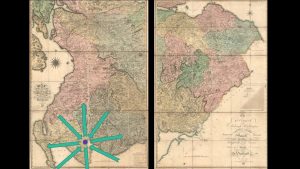
This paper considers Scottish Romanticism as a literary phenomenon rooted in the culture of ‘improvement’ in the late eighteenth and early nineteenth centuries. As I have discussed in Dialectics of Improvement (EUP, 2020), improvement was an enormously varied ideal of progress that ranged across subjects including manure and field drainage; roads and bridge building; tasteful landscaping; Christian piety; elocution and manners; slavery; political economy; and the macrohistory of western civilisation. Not only was improvement applicable to such a bewildering range of contexts, but some improvements directly counteracted others. This gave shape to a contest in the period over the change that seemed endemic to modernity in Scotland and further afield. The literary achievements of Scottish Romanticism, I will argue, can be understood as providing an imaginative register in which the labyrinthine spectacle of improvement – both its successes and failures – could be diagnosed, marvelled at and acted upon.
The paper will apply this general thesis to the media phenomenon of Walter Scott in the early nineteenth century. More specifically, it will draw on new manuscript evidence from the Wigtown Subscription Library (est. 1795) to examine a specific reading community immersed in Scott’s version of the history – and geography – of improvement. In the 1810s, Scott moved from being the most popular poet publishing in the English language to a unique position of cultural dominance as author of the Waverley Novels. Across his career, Scott’s works remained preoccupied with the dialectical unfolding of improvement, particularly insofar as the march of progress affected the durability and viable scale of localised cultures. He sometimes casts improvement as a necessary, bittersweet agent of imperial assimilation, but his works also cultivate an omnivorous curiosity in eccentricity and particularity – networking together pockets of ‘thickly’ described local and regional specificity at the global horizon of modernity. The paper will reframe this influential cultural geography from the viewpoint of the Wigtown library subscribers on the Solway coast in Galloway.
Semester 2 – 2022
7) Dr Nicola Martin, transatlantic military historian specialising in eighteenth-century British imperialism and Jacobitism, from the University of the Highlands and Islands presented a paper on 19th January 2022 entitled Inculcating loyalty in the Scottish Highlands: opportunities and risks of British military service during the Forty-Five.
Date: Wednesday, 19th January, 2022
Time: 4:30-6 p.m.
Venue: Webinar
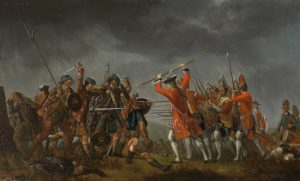 Royal Collection Trust / © Her Majesty Queen Elizabeth II
Royal Collection Trust / © Her Majesty Queen Elizabeth II
During the Forty-Five, far more Scots, including Highlanders, remained ostensibly loyal to the Crown than joined the Jacobites. Whilst the loyalty or disloyalty of those who remained in their homes throughout the conflict can rarely be proven, others openly demonstrated loyalty by enlisting with local militia units or the Highland Independent Companies. However, British army officers and government officials were apt to see all Highlanders as closet Jacobites, and this was compounded by the general characterisation of the Forty-Five as a Highland rebellion that threatened not only domestic but also imperial security. Such an understanding of the rising was widespread, despite the nationalist character of the Jacobite army in the rising as demonstrated by Murray Pittock.
Given the complex relationship between Highlanders and the British, this paper will investigate the role of Highlanders in the state-sponsored attempt to inculcate loyalty in the Highlands during the Forty-Five through the raising of Independent Companies. Matthew Dziennik has recently demonstrated the contribution of Highlanders to the British victory and the role of pragmatism in driving Highland decision making during the rising. This paper will investigate the ways in which pragmatism was balanced alongside personal conceptions of loyalty, neutrality, and rebellion to motivate Highland elites. Examining the experiences of the Highland Independent Companies during the rising, the paper will consider the lessons learnt by the British fiscal-military state regarding inculcating loyalty within potentially hostile populations and demonstrate the individual risks and potential rewards of military service for the Crown. Considering this important aspect of the Forty-Five furthers historians’ understanding of the role of Highland loyalists in the British victory and provides insights into understandings of loyalty and rebellion in the eighteenth-century British Atlantic world.
8) Emerita Prof Viviene E. Cree from the University of Edinburgh, home to the School of Social & Political Science, presented a paper on 9th February 2022 entitled The Life and Adventures of Mr George Robertson Nicoll. Nineteenth-century emigration from Dundee to NSW.
Date: Wednesday, 9th February, 2022
Time: 4:30-6 p.m.
Venue: Webinar
George Robertson Nicoll was an ordinary Dundee man, a blockmaker at the Shore, who went on to lead an extraordinary life, first crossing the seas with his wife and baby as an ‘assisted migrant’ in 1848, and thereafter travelling the world in search of fortune. Unusually for someone of his class and background, George kept a journal and wrote this up as an autobiography for his family and friends before his death in 1901. This seminar will locate George’s story in its wider social, economic and cultural context, making connections between the individual and the structural, the personal and the political, and past and present experiences of global migration.
9) Dr Rachel Davis, historian of late medieval Scotland from the University of Edinburgh will be presenting a paper on 23rd February entitled Gender, Agency, and Identity: Seals of Medieval Scotland.
Date: Wednesday, 23rd February, 2022
Time: 4:30-6 p.m.
Venue: Webinar
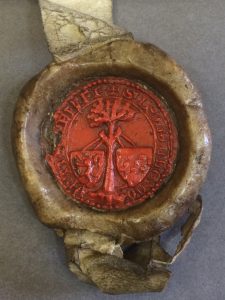
The socio-cultural and ontological significance of medieval seals is well-established, however, scholarship on seals continues to regard the use of heraldry as largely formulaic, rather than deliberately constructed to represent an individual’s links to nobility. Rather, seals created and curated their identity, agency, and authority. This paper will consider an array of examples from the late medieval period belonging to male and female members of the elite. It will analyse and contextualise the heraldic and other imagery present in their seals and what they tell us about gender, agency, and identity in late medieval Scotland.
10) On Wednesday, 9th March, Dr Craig Lamont, focusing on Scotland, Scottish Literature and Glasgow in the Georgian era, from the University of Glasgow presented his latest research through a paper entitled Georgian Glasgow and memory.
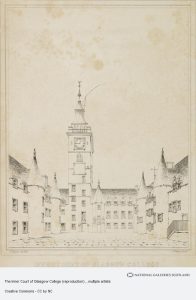
This talk on Georgian Glasgow and memory is based on the research that went into the speaker’s debut monograph, The Cultural Memory of Georgian Glasgow (2021). The talk will explore the different theories in memory studies that allow new perspectives on the history of cities more widely, before looking at specific cultural memories embedded in literature of the Georgian period. Theories such as literary tourism and spontaneity – a trope of Romantic poetry – will feature, beside an overview of material and visual culture including maps, statues, and paintings. By looking at these different ‘access points’ into memory, Glasgow’s often-overlooked involvement in the Scottish Enlightenment and transatlantic slavery will be brought to the fore.
Date: Wednesday, 9th March, 2022
Time: 4:30-6 p.m.
Venue: Webinar
